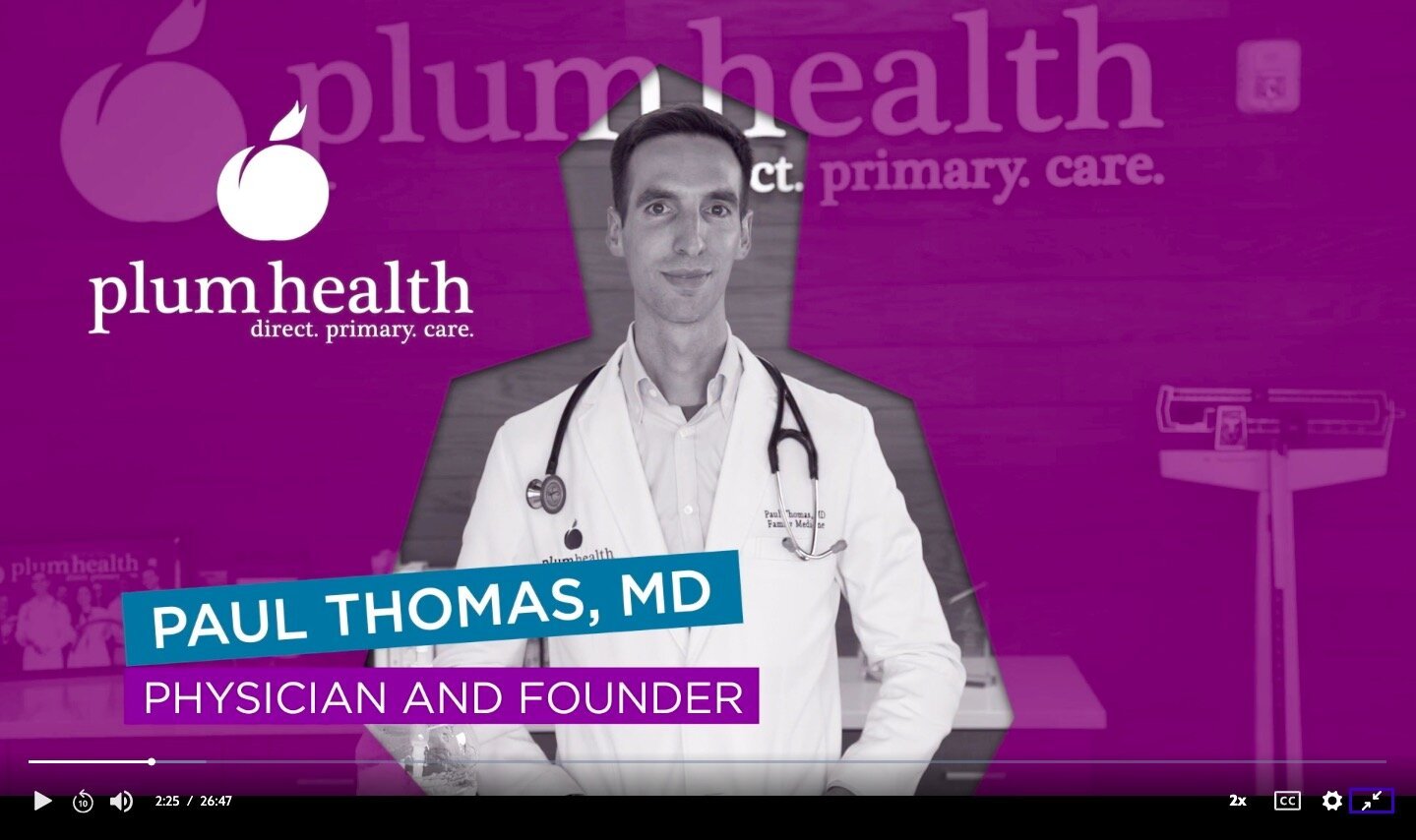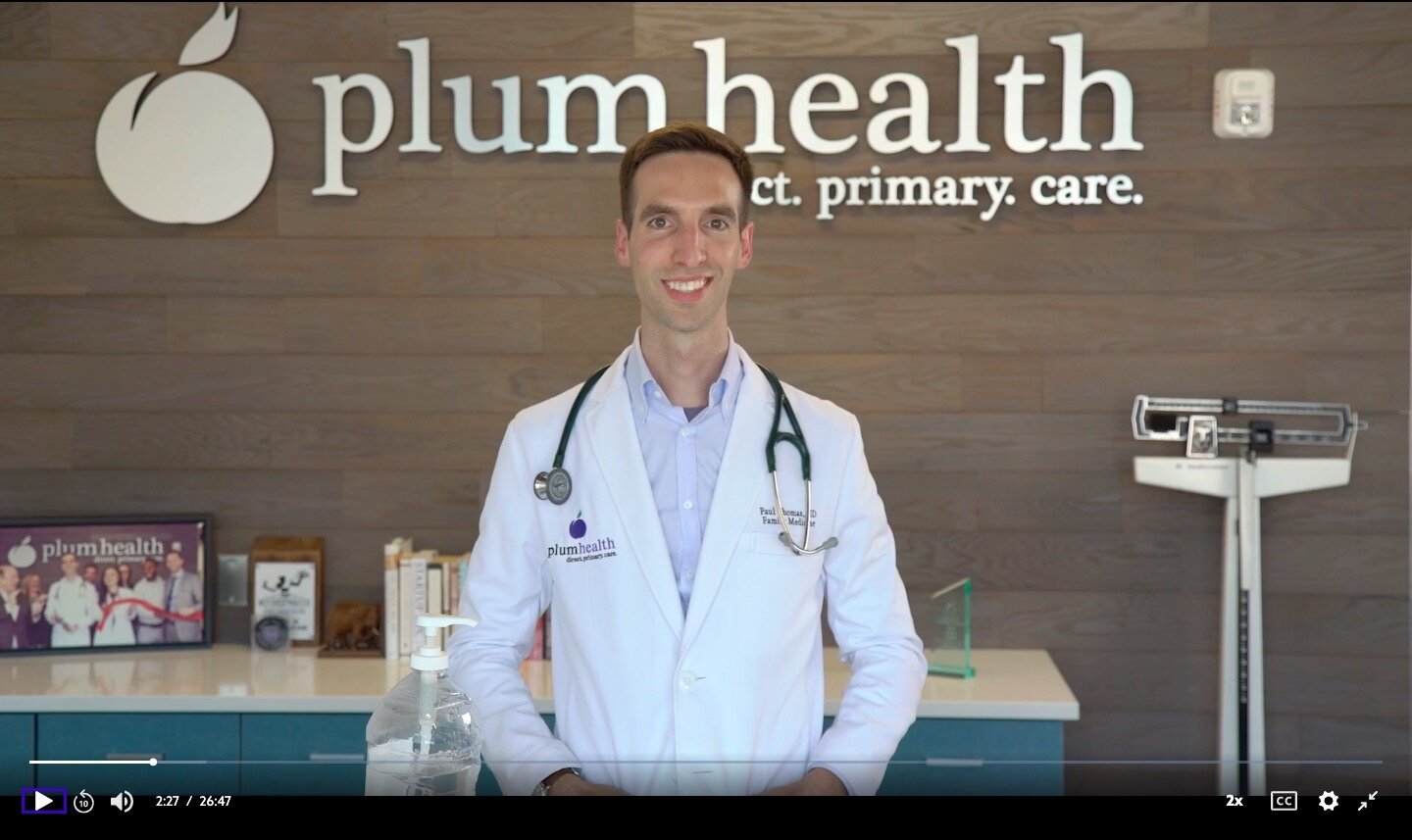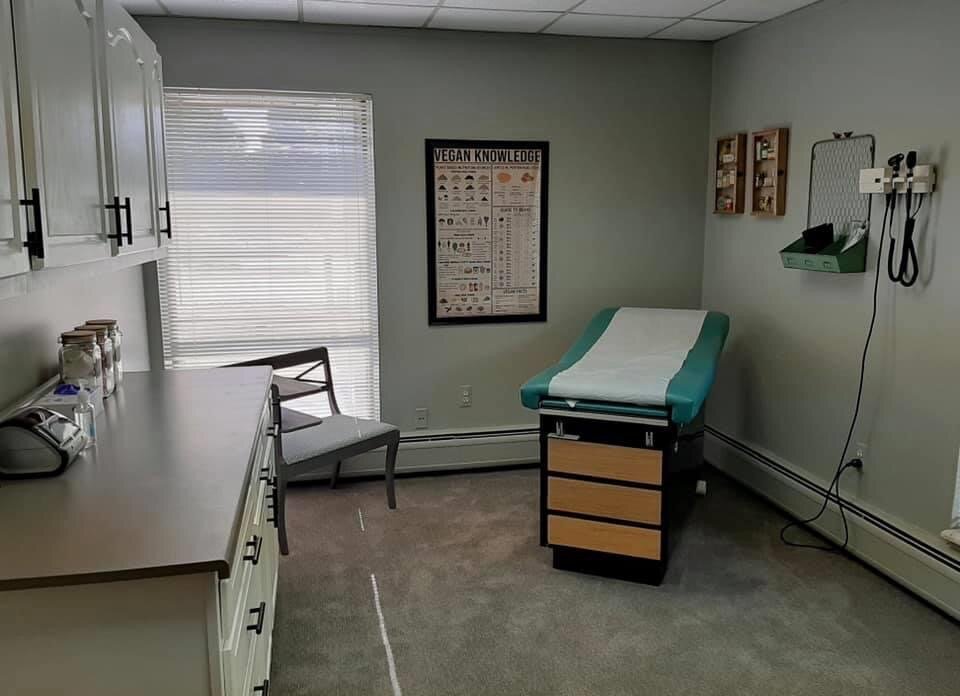Plum Health Blog
Plum Health DPC Featured on PBS Nationally
Plum Health featured on PBS’ Start Up Show
Plum Health DPC was featured on the PBS show Start Up - we filmed this in July 2020 and it was a great opportunity to share about our mission to deliver affordable and accessible healthcare services in Detroit and beyond. The host Gary Bredow and his team interviewed our staff and our patients, including our doctors Raquel Orlich, DO and Jamie Qualls, DO.
Plum Health Start Up show Episode Overview
Here’s what PBS had to say about the episode:
Dr. Paul Thomas knew what he wanted to do with his life since the age of 17. After completing medical school, residency and a short stint at an Urgent Care facility, he founded Plum Health. Plum Health offers direct primary care services based on a subscription model. Rather than charge patients for each visit, patients pay a set fee each month, gaining direct access to doctors as needed.
Why Direct primary care is appealing for Patients
During the episode, the host Gary Bredow interviews a few of our patients. He talks with Will Langford and he talks about being seen by his doctors, and understood by his doctors. Will says that “I believe that Plum Health is the future of medicine.” He goes on to say that, “for people who’ve never experienced direct primary care - it’s worth it. If you’ve ever felt that a doctor didn’t see you, or didn’t hear you, or didn’t believe you, anybody who’s just wanted help, and they haven’t gotten it from people who were supposed to help, try direct primary care.”
Will “The Poet” Langford discusses why he’s a part of Plum Health DPC with Gary Bredow, the host of the Start Up show on PBS.
Why Direct primary care is appealing for Doctors
During the episode at about the 10 minute mark, Gary Bredow sits down with Dr. Raquel Orlich and asks “what do you find attractive or appealing about this model versus the traditional model?” Dr. Orlich discusses the importance of talking with patients and getting to know them, and the ease of communication via in-person appointments, text messages, and emails. She also discusses the importance of having enough time to work through all of the factors that are affecting her patients’ health, and this can lead to patients feeling heard and being able to get to the root of their health care problems.
Raquel Orlich, DO of Plum Health DPC during the filming of Start Up with Gary Bredow on PBS. Plum Health DPC is a direct primary care practice in Detroit and Farmington Hills that delivers affordable and accessible health care services.
Dr. Jamie Qualls is working with Plum Health out of our Farmington Hills, Michigan location and she joined our practice because she can “go out and be the doctor I really wanted to be.” She goes on to say that this direct primary care model is growing rapidly not only across the country, but locally, and patients are loving the experience of being a part of Plum Health and a part of direct primary care practices in general. The direct relationship between doctors and patients is really appealing to patients in our practice.
Dr. Jamie Qualls, DO, MPH of Plum Health DPC talks with the host Gary Bredow about why the direct primary care model works for both patients and doctors.
“Maybe the direct primary care model is the future.”
There were so many memorable moments from this episode, but perhaps the most powerful sentiment was communicated in the closing remarks of the host of the show, Gary Bredow. He said:
“After speaking with several of his patients, his model is working. Throughout our conversation, I couldn’t help but wonder why a common-sense approach to health care seemed so foreign to me. Dealing with insurance companies is all that many of us have ever known. Waiting on hold for hours at a time trying to speak with someone and trying to decode confusing bills has always been synonymous with healthcare for me. I just assumed that it’s a part of the wellness process.
“But this is something entirely different. Individuals pay an affordable monthly rate for the service, the doctor gets to spend more time with patients, which possibly leads to better preventative care and you don’t have to wonder what your next visit is going to cost, or have to deal with co-pays, deductibles, or out of pocket expenses. To me, the health care system is not working for everyone equally with millions of people uninsured or underinsured. Maybe the direct primary care model is the future. Either way, it’s nice to know that there’s options available.”
We agree - direct primary care is the future, or at least a part of it. While direct primary care will never replace catastrophic insurance or some form of insurance coverage that serves as a financial tool to prevent bankruptcy, insurance can never give to patients what direct primary care gives to patients - a straightforward and trusting relationship between doctors and their patients.
How to Sign Up
If you want this type of care for yourself or your loved ones, your business or your family, you can enroll here.
Thanks for reading and watching this segment, and we are happy to help you in your journey to better health!
-Drs. Paul Thomas, MD, Raquel Orlich, DO, Jamie Qualls, DO, MPH, and Leslie Rabaut, DO
Paul Thomas, MD of Plum Health DPC during the filming of Start Up with Gary Bredow on PBS. Plum Health DPC is a direct primary care practice in Detroit and Farmington Hills that delivers affordable and accessible health care services.
Coronavirus Update and Vaccine Side Effects with Dr. Jamie Qualls and Dr. Paul Thomas
Coronavirus Update for January 26th, 2021
Today, Dr. Paul Thomas and Dr. Jamie Qualls of Plum Health DPC discuss the Coronavirus pandemic and what’s happening in Detroit and Southeast Michigan with regard to the Coronavirus.
There have been 551,080 cases of Coronavirus in Michigan and there have been 14,326 deaths from coronavirus. In context, losing that many people to COVID 19 is like losing the entire population of Rochester with a population of 13,162, Wixom with a population of 13,902, or Harper Woods with a population of 13,895.
Age Groups Affected by the Coronavirus
The age group with the highest number of cases are those between 20 and 29 years. There have been about 103,956 cases in this age group and 54 deaths. The age group with the highest number of deaths are those 80 years old or older. In those 80 years of age or older, there have been 27,327 cases and 6,675 deaths.
The death rate among the elderly in Michigan is staggering. If you are 80 years of age or older and you are infected by the coronavirus, there’s about a 24% chance of dying from COVID (6,675 deaths among 27,327 cases).
That’s why it’s so important that the elderly (those 75 years of age and older) are prioritized for vaccine access.
Coronavirus Vaccines Administered (So Far)
So far, about 19 million first doses have been given out in the United States and about 3 million people in the US have received both doses of the COVID 19 vaccine. In Michigan, about 730,000 vaccines have been administered. You can dive into the nitty gritty at the Michigan Coronavirus vaccine dashboard.
Coronavirus Vaccine Side Effects
With the COVID-19 vaccine rollout, there is understandably much apprehension about its potential side effects. According to the CDC, some of the most common side effects reported are pain and swelling at the region of injection, as well as fevers, fatigue, chills, and muscle aches. (https://www.cdc.gov/coronavirus/2019-ncov/vaccines/expect/after.html)
The CDC recommends taking an over the counter medication like ibuprofen or Tylenol to reduce the discomfort of these side effects. It’s also recommended to drink plenty of fluids and get adequate rest. Most of these side effects resolve on their own within a few days. These side effects are likely a result of your body responding to the vaccine and mounting an immune response, which is a sign that the vaccine is doing its job (https://www.aarp.org/health/conditions-treatments/info-2020/coronavirus-vaccine-side-effects/).
Side effects from the COVID vaccine may cause recipients to miss a day or two of work, but typically resolve without further intervention.
Cough, shortness of breath, rhinorrhea, sore throat and loss of taste or smell are not typical following vaccination. If you develop these symptoms, the CDC recommends staying home from work pending evaluation for possible causes including COVID-19.
There have been reports of people developing a severe allergic reaction to the vaccine. The CDC recommends seeking immediate medical attention in the event of an allergic reaction. It is important to keep in mind that these reactions, though serious, are relatively rare, seeing as tens of thousands of people have been vaccinated without severe reactions. (https://www.cdc.gov/mmwr/volumes/70/wr/mm7002e1.htm)
Finally, it’s important to recognize that side effects from all vaccines are common. The seasonal flu shot, for example, can cause fever, fatigue, and muscle aches, amongst other vaccines. The important thing is to weigh the temporary discomfort of such side effects to the long term benefits: a potentially high level of protection from a disease that has killed more than 1.6 million people globally.
Final Thoughts
As always, wear a mask, wash your hands, maintain a minimum of 6 feet of physical distance between yourself and others, and limit unnecessary travel, trips, and crowded areas.
Thanks for reading and have a wonderful week,
-Dr. Paul Thomas and Dr. Jamie Qualls of Plum Health DPC
Dr. Jamie Qualls is a Family Medicine Doctor in Farmington Hills, Michigan
Shout out to Dr. Jamie Qualls, family physician and frontline healthcare worker. 👩🏼⚕️
Dr. Jamie has been helping us serve patients at our Plum Health DPC office in Farmington Hills, Michigan.
She is diligent, caring, and an excellent physician - we're lucky to have her serving and healing patients in our broader community. 🏥
Thank you Dr. Qualls for all that you do, and in helping us deliver affordable and accessible care in Detroit and beyond. 💉 💊 🌱
Jamie Qualls, DO is a trusted family medicine doctor in Farmington Hills, Michigan. She operates Plum Health DPC - Farmington and is accepting new patients.
Jamie Qualls, DO, MPH is both a family medicine physician and a master of public health. She is able to take care of patients individually and the greater community with her additional training. She is passionate about forming strong relationships with her patients. Her clinical interests include community and public health, chronic disease prevention and reversal using a food as medicine approach, LGBTQ-friendly medicine, and osteopathic manipulative medicine for chronic musculoskeletal issues. She is a graduate of Michigan State University College of Osteopathic Medicine and completed her residency training at Ascension Providence Hospital.
Thanks for reading,
-Dr. Paul Thomas with Plum Health DPC
Dr. Jamie Qualls is Changing the Game for Primary Care in Farmington Hills
Dr. Jamie Qualls is a family medicine doctor taking care of patients in Farmington Hills, Michigan. She started practicing with Plum Health DPC in July 2020 and she has already created some excellent health care experiences for her patients.
She uses a membership model for health care, also known as the direct primary care model, to make health care affordable and accessible for her patients. This allows her to spend more time with each of her patients and it allows her to use that time to come up with the best possible treatment plans for her patients.
Dr. Jamie Qualls often takes a wholistic approach to patient care, incorporating dietary recommendations to help her patients achieve their desired health goals. You can meet with Dr. Jamie Qualls and learn more about her approach by scheduling a consultation, here:
Dr. Qualls focuses on delivering not only excellent health care, but also an excellent health care experience. Here’s what one of Dr. Jamie Qualls patients had to say about their experience at Plum Health DPC in Farmington Hills, MI:
Dr. Jamie Qualls is a family medicine doctor in Farmington Hills Michigan. She uses a membership model for health care, also known as the direct primary care model, to make health care affordable and accessible for her patients.
Men's Health in Detroit
Men’s Health in Detroit
There are a number of preventive services that men need to stay healthy as they age. Basic items include annual flu shots and annual blood work to check for cholesterol levels. Checking your blood pressure, height, and weight is also important to screen for hypertension and obesity.
As men age, more complex screening tests are needed. For example, at age 50, men need a Colonoscopy to check for colon cancer. Men who smoke require an ultrasound of the abdominal aorta to rule out an aortic aneurysm at age 65. Men who smoke the equivalent of 1 pack per day for 20 years would benefit from a CT scan of the lungs to rule out lung cancer starting at age 50. From the United States Preventive Services Task Force:
The USPSTF recommends annual screening for lung cancer with low-dose computed tomography (LDCT) in adults ages 50 to 80 years who have a 20 pack-year smoking history and currently smoke or have quit within the past 15 years.
If you’d like us to help you coordinate these tests by becoming your primary care doctor, you can sign up on our website, here.
Men’s Health Event in Detroit
On the note of preventive service, this weekend, the MIU Men’s Health Foundation is providing an opportunity to do check some of these screening tests off of your list. This Saturday, September 26th, the foundation is hosting its 10th annual Men’s Health Event at the Michigan State Fairgrounds. The event will run from 9AM-4PM and the entrance is located at 770 W. State Fair, in Highland Park. To avoid waiting in a line, they do recommend scheduling a time for your drive-through by registering at this website.
All Metro Detroit-area men, ages 18 years and older, with or without insurance, can participate in this completely drive-through event. All services are completely free, and include vital screenings, a bloodwork panel, flu vaccinations, FIT kits for colorectal cancer screening, COVID-19 nasal swab testing, and HIV testing. All testing will be administered without participants needing to leave their vehicles. Blood work results will be texted back, unless other arrangements are made at the event, and you do not need to be fasting for the blood draw. More information about the event is available here.
The Debate on Prostate Cancer Screening in Detroit
Prostate Cancer screening is a double-edged sword. Prostate specific antigen is a protein made by the prostate that can become elevated during prostate cancer. It can be easily tested with a blood draw. Just because it can be easily tested, doesn’t mean it should be tested. Usually, PSA testing is done on an annual basis for men with a family history of prostate cancer.
The test is only recommended for men between the ages of 55 and 69. If you don’t have a family history of prostate cancer, and you get the PSA test, and it comes back high, a workup may be recommended. To find out if you have prostate cancer, a trans-rectal biopsy is performed. That means a Urologist or a prostate cancer specialist inserts an instrument into your butthole/rectum, and uses an instrument to take a piece of tissue from your prostate.
Because this biopsy is close to other important nerves and blood vessels that can control urine function and erectile function, this transrectal biopsy and other procedures to test for and treat prostate cancer can result in loss of urinary function and loss of erectile function.
You must know these facts before being tested for prostate cancer with a simple blood test.
From the United States Preventive Services Task Force:
For men aged 55 to 69 years, the decision to undergo periodic prostate-specific antigen (PSA)-based screening for prostate cancer should be an individual one. Before deciding whether to be screened, men should have an opportunity to discuss the potential benefits and harms of screening with their clinician and to incorporate their values and preferences in the decision. Screening offers a small potential benefit of reducing the chance of death from prostate cancer in some men. However, many men will experience potential harms of screening, including false-positive results that require additional testing and possible prostate biopsy; overdiagnosis and overtreatment; and treatment complications, such as incontinence and erectile dysfunction. In determining whether this service is appropriate in individual cases, patients and clinicians should consider the balance of benefits and harms on the basis of family history, race/ethnicity, comorbid medical conditions, patient values about the benefits and harms of screening and treatment-specific outcomes, and other health needs. Clinicians should not screen men who do not express a preference for screening.
I’ll repeat that information for emphasis: Screening offers a small potential benefit of reducing the chance of death from prostate cancer in some men. However, many men will experience potential harms of screening, including false-positive results that require additional testing and possible prostate biopsy; overdiagnosis and overtreatment; and treatment complications, such as incontinence and erectile dysfunction.
Thanks for reading, and we hope you take advantage of these screening tests, when appropriate.
-Dr. Paul Thomas with Plum Health DPC
Direct Primary Care Removes the Middlemen and Lowers the Cost of Health Care
There are perverse incentives in the healthcare system. As a part of my mission to provide affordable and accessible health care in Detroit and beyond, it needs to be said that the middlemen in healthcare inflate the cost of the care that you receive.
Anthem Revenue $104 Billion (2019)
Cigna Revenue $154 Billion (2019)
United Revenue $242 Billion (2019)
Cigna CEO salary $18.9 million (2018)
United CEO salary $21.5 million (2018)
Blue Cross CEO salary $19.2 million (2018)
The total annual healthcare spending in the US is over $3.6 trillion annually.
Healthcare spending on administration: 34%
Healthcare spending on physician salary: 8.6%
When your doctor can’t get you the tests/imaging/procedures/surgery/medication you NEED, remind yourself that the middle management, the CEOs, the lobbyists for health insurance company did NOT swear an oath to put your health above money.
Your doctor did.
Doctors are missing sleep, skipping vacation, answering calls on weekend and holidays, missing important family events, and otherwise working tirelessly to keep you healthy.
All of that's to say that I firmly believe in the power of the doctor-patient relationship and removing the middlemen from this equation. This is why we do what we do at Plum Health DPC.
https://www.plumhealthdpc.com/
#DirectPrimaryCare #PlumHealth
Connect with me on LinkedIn:
Plum Health DPC Featured in the Farmington Voice
Dr. Jamie Qualls of Plum Health DPC in Farmington Hills, Michigan was featured by the Farmington Voice this week. The Farmington Voice is a local paper that covers local news in the Farmington and Farmington Hills communities and Dr. Jamie Qualls and the arrival of her new primary care office therein received some nice coverage:
For a monthly membership fee, Plum Health Direct Primary Care (DPC) offers wholesale prices on medication and deeply discounted fees for x-rays and other tests. In addition, Dr. Jamie Qualls is available to patients anytime by text, email, or phone .
Having completed her residency in June, Qualls said this is the kind of medicine she has always wanted to practice. She chose the office in Civic Center Office Plaza, 25882 Orchard Lake Road, because of the central location and easy access to the freeway.
Here’s a link to the full article.
Dr. Jamie Qualls at her family medicine office in Farmington Hills, Michigan. Dr. Jamie Qualls is a family medicine doctor, using the direct primary care model, and is accepting new patients.
Family Medicine Doctor Accepting New Patients in Farmington Hills Michigan
Dr. Jamie Qualls is a Family Medicine Doctor practicing in Farmington Hills Michigan with Plum Health DPC. She is accepting new patients.
Dr. Jamie Qualls is a family medicine doctor accepting new patients in Farmington Hills, Michigan. She is a Board Certified Family Medicine doctor who completed her residency here in Southeast Michigan at Ascension Providence Hospital. She is a graduate of Michigan State University College of Osteopathic Medicine.
Dr. Jamie Qualls practices full time at the Plum Health DPC office in Farmington Hills, Michigan - the address is 25882 Orchard Lake Road, Suite 200B, Farmington Hills, MI 48336.
As a family medicine physician, Dr. Jamie Qualls has a broad scope of practice. She helps patients manage chronic conditions like diabetes, high blood pressure, depression, anxiety, mood disorders, asthma, COPD, and many more. Dr. Qualls is also proficient in caring for urgent concerns, like urinary tract infections, laceration repairs, ingrown toenails, strep throat, viral gastroenteritis, and others.
Finally, Dr. Qualls excels at integrating plant based nutrition into her care plans to produce optimal health outcomes for her patients. Dr. Qualls can collect blood work in the office to test for cholesterol levels, thyroid disorders, electrolyte imbalances, and kidney or liver disorders. She can also coordinate imaging studies that may be needed to make an accurate diagnosis.
To become a patient of Dr. Qualls, please sign up here.





















